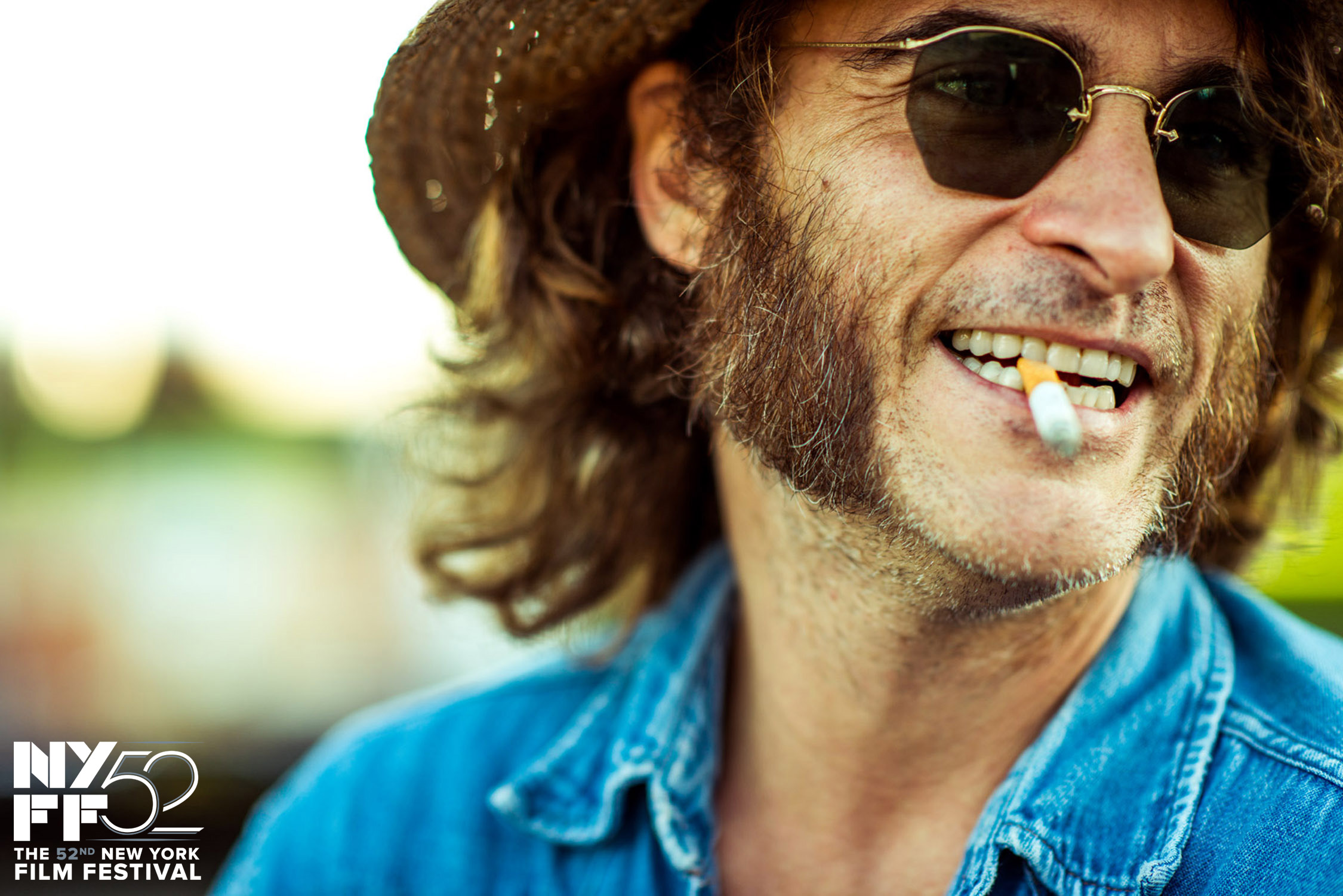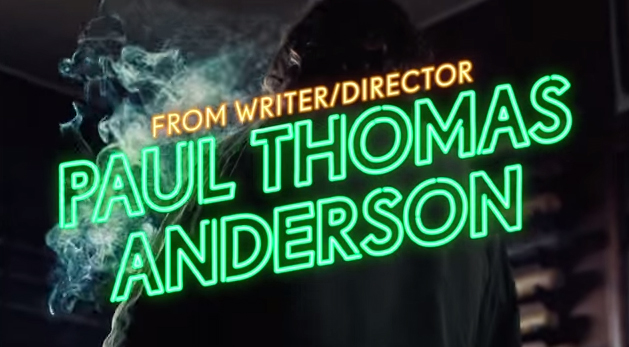 Hello dear readers. Your host Nathaniel here for our penultimate article on this year's New York Film Festival. I hope you've enjoyed the reviews from Glenn, Michael, Jason and me. Several people have asked why none of us reviewed Inherent Vice or if any of us had seen it. Strangely we all were there. But then no one claimed it so we've opted to have a conversation about it at least in part to figure out what held us back. Let's begin...
Hello dear readers. Your host Nathaniel here for our penultimate article on this year's New York Film Festival. I hope you've enjoyed the reviews from Glenn, Michael, Jason and me. Several people have asked why none of us reviewed Inherent Vice or if any of us had seen it. Strangely we all were there. But then no one claimed it so we've opted to have a conversation about it at least in part to figure out what held us back. Let's begin...
NATHANIEL R: It just goes to show you you never know. Alejandro G. Innaritu is one of my least favorite wildly acclaimed auteurs and Paul Thomas Anderson is one of my all time favorite wildly acclaimed auteurs. And yet here I am at the end of New York Film Festival after screenings of Birdman and Inherent Vice and guess who provided cinematic ecstacy and guess who gave a bad trip? It's Opposite World!
I reach out to you Glenn, Jason, and Michael to help me parse my feelings since you've also been devouring the NYFF. The Inherent Vice screening was a full week ago and I am no closer to writing anything about it. I keep hearing that it's a perfect stoner movie. Do I not like it because I am not into weed (so perfectly capturing that feeling would be lost on me) or because it's simply not good: shapeless, meandering, super-indulgent, and purposefully incoherent?
[more]
MICHAEL C: To say that something is “a perfect stoner movie” is a backhanded compliment. If you have ever heard somebody high try to tell a story, you know that narrative focus isn’t a stoner’s strong suit. Previous pot classics like The Big Lewbowski compensated for this by keeping the filmmaking sharp even as the hero struggles to untangle the convoluted plot. The Dude may be baked but the Coens are sober. PT Anderson gives the audience no such objective distance. The film puts us right into “Doc” Sportello’s pot-addled state of mind where things flow freely between reality and paranoid delusions, and the whole thing exists under several layers of woozy, sun-baked haze. It's a choice that leads to a film that is both fascinating and maddening.
NATHANIEL: Yup, though more maddening than fascinating. Maybe I'm turned off because with each new movie P.T. Anderson seems to be on a perpetual downward slide in his ability to present female characters in a interesting way. We're a long long way from Amber Waves and Rollergirl at this point. The ladies here have nothing to do other than act as titillating sex objects without inner lives. The movie doesn't even pass the Bechdel Test despite at least four key females and it's narrated by one of the female characters but there's absolutely no sense that it's from her perspective and no scenes through which we get to know her either which makes that an inexplicably odd choice. Worst of all one woman with several lines of dialogue, the wife of Josh Brolin's "BigFoot", is actually decapitated by the framing; you never see her face! I'd consider it an amusing visual because of the content of the scene since the movie introduces a tertiary male character that way, too, but the difference is he eventually comes into view (despite being just as inconsequential to the narrative) and the men aren't all treated like whores.
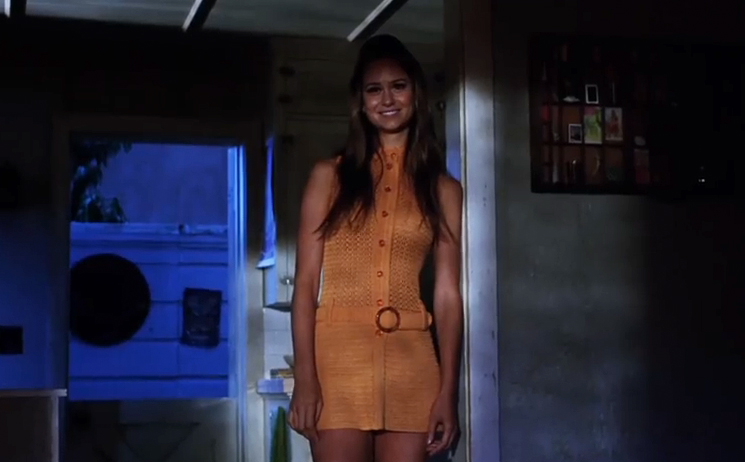
MICHAEL C: I have a hard time coming down too hard on Inherent Vice for weak female characters when, to my mind, all the characters have an equally difficult time coming into focus through the thick cloud of pot smoke. That the story is purposefully incoherent, as you put it, didn’t bother me since detective noir tradition means the nuts and bolts of who did what are supposed to take a backseat to the eccentric characters we meet along the way. What did bother me is that the characters didn’t pop the way I expect from Anderson. Say what you will about the vague storytelling of The Master, Freddie Quell and Lancaster Dodd were characters with a capital C. I didn’t meet anybody like that here. Detective Noir thrives on sharp character interactions and Inherent Vice creates a film in which nothing is sharp.
GLENN: I have been equating Inherent Vice with listening to a stoner tell a really complicated story while you're stone cold sober. And while stoner movies can be great when filmmakers know the limitations - I greatly admire Gregg Araki's Smiley Face and think it's hilarious without needing to be high, and thought Michael's description of the Coens' The Big Lebowski was spot on - but I get the distinct impression that everyone making this movie was in such a haze of smoke that they didn't realize they were making a movie that is 150 minutes of not a helluva lot with nothing to say about men and women, sex, crime, class - hell, even marijuana. All topics it appears to raise, but not do anything with.
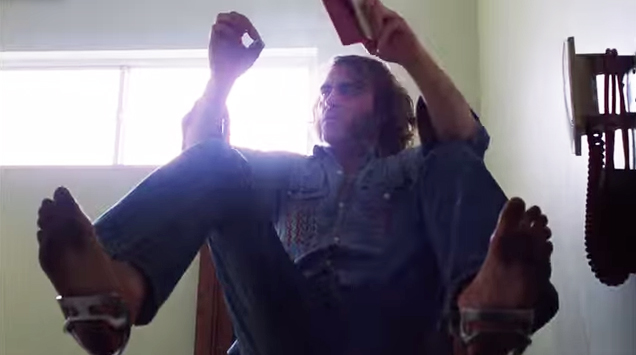
I hate criticizing movies for being too complex to follow, but I was lost by the opening scene and it just gets worse. I didn't understand many of Anderson's storytelling decisions - the Joanna Newsom narration is particularly baffling - and the film came off as messy whereas his other films felt so focused on the end game even in spite of their fantastical whims and occasional hysteria. I get what he was going for, but it feels like a lot of work for very little payoff. There's next to no dramatic arc whatsoever (except for the Owen Wilson character), and many of it's best moments felt like sidetracked vignettes on the fringe.
NATHANIEL: You've both described the feel and the lack of Character or Story so perfectly. You know what it reminded me of after the fact? Something that I just couldn't name or shake at first and then I had my a-ha moment. It reminded me of a visual version of the audio commentary on Boogie Nights. Boogie Nights is one of the greatest movies of all time and I was so disappointed with the commentary track when the special edition came out a super long time ago because it seemed like Anderson and his actors just hanging around cracking each other up and only occasionally talking about the movie, or remembering that film buffs would be listening along at home because they, you know, love the movie. So maybe include us and play for us or to us rather than with and for yourselves?
Despite my dislike of the movie, I cherish nearly everything Josh Brolin in it.
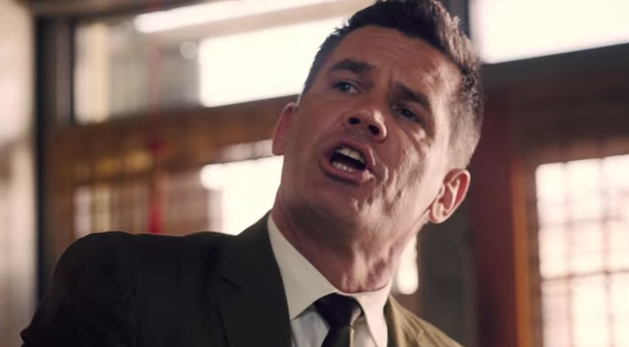
Motto pankēki!"
Were there any moments or characters you loved like that despite not thinking the movie worked?
JASON: There are a lot of reasons that I wish I too could take Anderson to task. I miss the dude who made Boogie Nights and Magnolia and Punch-Drunk Love (especially PDL, that's my personal favorite) too - the characters that pop off the screen, the show-offy camera-work, the wunderkind pizazz. For another I think that the only proper response to somebody saying that "You need to see it a second time to understand it" is a slap across their face with a single glove and a pistol duel at dawn - a movie's got to earn that right up front, on a one-to-one basis, and if it doesn't, it don't.
And yet... I really would like to watch Inherent Vice a second time.
I was stand-offish with it for awhile but around the mid-point we really warmed to each other, and by the time it was done I was digging its spaced-age vibe, its oddly cool refusal to play by any rules save its own while simultaneously riffing on every Noir staple under the baked golden Californian sun. These characters have stuck to me by skittering away sideways from sticking - take Shasta Fay, the anti femme fatale who sets the mystery in motion and then promptly disappears... just cuz. Not to get spoilery but when she swims back into view through the story's own self-perpetuated fog, that scene... that scene! God that relationship and its byzantine unspoken oddness - it's fascinating to me for what it isn't, I guess, and for what they only sorta let us see it is. These people are little mysteries to themselves, and don't really seem to know why they're even doing what they're doing.
Calling the movie's vibe "stoned" is easy but I think it's reductive; I think it's more just about an inability of expression - Doc, for all of Joaquin's grimy amiableness, can't seem to express what he's doing or why; we don't realize what his goals are until they've half-tumbled past, and he and Shasta Fay certainly can't seem to get a handle on their thing even as it's defining their every graceless swerve. I can see all of this being a frustrating experience for a viewer but at the same time, it gets to the heart of something kinda incandescent too.
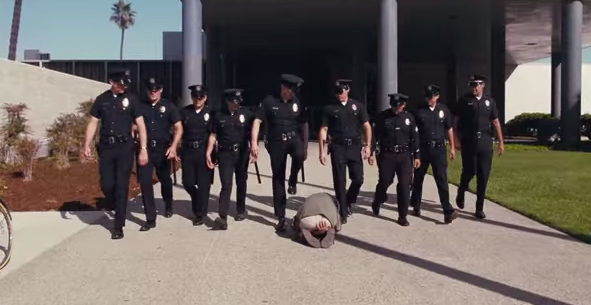
GLENN: I don't necessarily blame the film entirely for being confusing. Maybe those who've read the Pynchon novel will understand it better, or maybe those who have a particular reverence for this era will find the experience more rewarding than I. Perhaps the most disappointing thing about it is that I am not particularly inspired to watch it again. It doesn't even feel like a failure in the ways that we can inspect it and study it and see what went wrong. I have no doubt that Inherent Vice is exactly the movie Paul Thomas Anderson wanted to make, it was just sadly not the film I wanted to watch. What that says about me, I'm not sure, but it's a personal reaction to a property that is impossible to ignore. I can admire it in many ways formally, but as an experience of sitting in a darkened theatre I did not enjoy it.
MICHAEL: I’m glad you framed the question in terms of moments, since that gives me an opportunity to praise the film. I found Vice beguiling on a moment-to-moment basis. It totally earns a second viewing from me, as Jason perfectly phrased it. (the “It require a second viewing!” cop out irks the hell out of me too, though)
I think my top twenty favorite moments from the film would all involve Joaquin Phoenix’s brilliantly entertaining performance, which I flat-out loved even if I never totally get a grip on the character. Doc Sportello’s ineptitude as a P.I. was endlessly amusing and the running joke about the uselessness of his note taking skills made me guffaw every time. Elsewhere, Phoenix’s scramble to escape from handcuffs is so madly frenetic that it managed to redeem the whole “killer leaves the hero alone to give him time to escape” cliché. Plus, Doc has a spellbinding flashback involving Shasta, a Ouija board, and a rainstorm that is worth sitting through any amount of woozy, meandering to arrive at.
I was also enraptured by a beauty of a long take where Owen Wilson delivers a lengthy monologue in one long, uncut push in. I expect my appreciation of that scene to grow when I eventually decipher what the hell it is they’re talking about.
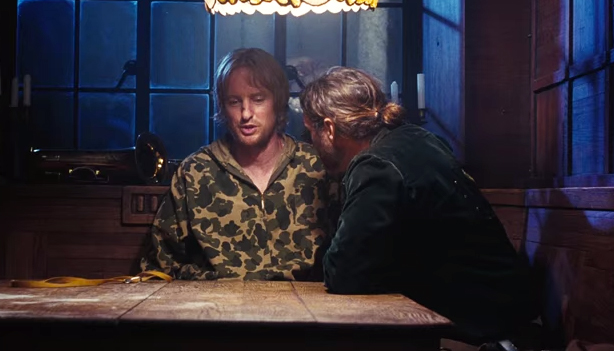
NATHANIEL: Hearing you all recite these moments makes me think the movie will have a long shelf life, and not just because it's a P.T. Anderson film and the celebrated auteurs bring even their weakest films into immortality by their name up top. I think since the birth of home viewing, movies that play well in tiny fragments are often considered to be better than they actually are if people aren't really looking at the whole film. Or aren't recalling it.
I just hope this isn't a new direction for P.T. Anderson. This is a few minutes longer than The Master and only a few minutes shorter than Boogie Nights but it's got so much less to say than either of them (or isn't considered with saying it in an intelligible way) and, most disappointingly, despite a huge ensemble a dearth of three dimensional characters that you can imagine existing outside the movie.
I'll grant it the occasional laugh, especially the note-taking you mention, Michael. I actually relate! Doc's notes are *just* like my scribblings at critics screenings and even during this very movie. Scribblings which I promptly ignore post-screening never using them when I write my reviews.

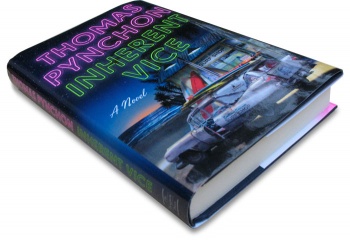 Inherent Vice doesn't open until December 12th in limited release and wide on January 9th so readers have a long time to read the novel beforehand to help decipher the baked movie.
Inherent Vice doesn't open until December 12th in limited release and wide on January 9th so readers have a long time to read the novel beforehand to help decipher the baked movie.
